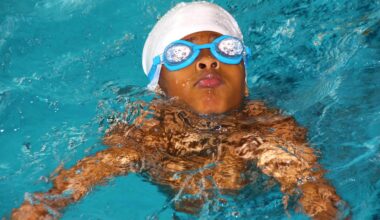How Sleep Impacts Fitness Progress in Kids and Teens
Sleep is crucial for overall health and fitness, particularly among kids and teens who are in their crucial growth phase. It plays a significant role in workout recovery, cognitive function, and emotional stability. During sleep, the body undergoes essential repair processes that promote muscle growth and recovery. For young athletes, adequate rest enhances physical performance by ensuring that they can handle fatigue during sports. Studies suggest that inadequate sleep may result in diminished energy levels and increased injury risk due to slower reaction times. Over time, poor sleep patterns can lead to a lack of motivation and focus, negatively influencing fitness routines. A consistent sleep schedule promotes better sleep quality, allowing youngsters to maximize potential and minimize setbacks in fitness progress. Parents and guardians should encourage proper sleep habits alongside physical activity to create a supportive environment. This not only fosters a positive attitude towards fitness but also reinforces the importance of recovery in the overall training process. Emphasizing sleep hygiene and prioritizing rest are critical components to ensuring young fitness enthusiasts achieve their goals.
In addition to physical recovery, sleep significantly impacts mental focus, an essential aspect of athletic performance. When kids and teens are sleep-deprived, they often experience difficulties in concentrating, which can hinder their ability to follow instructions from coaches or trainers. This lack of attentiveness could lead to poor decision-making during practices or games, ultimately affecting their performance on the field or court. As kids engage in various sports and fitness activities, maintaining a sharp mind is as vital as physical strength. A well-rested mind contributes to better coordination, quicker reflexes, and higher confidence levels. Furthermore, sleep is essential for emotional regulation, helping young athletes manage stress and anxiety related to competition. In the absence of sufficient sleep, emotional outbursts may occur, leading to a pessimistic outlook that can deter youngsters from pursuing their fitness goals. Establishing a conducive sleeping environment free from distractions can foster a positive mindset and sustain motivation. Sleep must be recognized as a cornerstone of athletic training, playing a considerable role in shaping the overall fitness journey for kids and teens.
The Link Between Sleep and Growth Hormones
Growth hormones, which play a fundamental role in physical development, are primarily secreted during sleep, particularly during deep REM stages. For kids and teens, this hormone is crucial for somatic growth, enhancing muscle and bone development, thus allowing them to reach their full potential in fitness and performance. Inadequate sleep can lower hormone levels, impacting not only physical growth but also how effectively young athletes recover from physical exertion. A strong relationship exists between sleep duration and hormone secretion, highlighting the necessity for sufficient nightly rest in children and teenagers involved in physical activities. Parents should be cautious about their children’s sleep schedules, as lack of rest can manifest in slower metabolism and reduced energy levels. Encouraging a bedtime routine that promotes relaxation can lead to improved sleep quality and duration. Practices such as minimizing screen time and creating a calming atmosphere before bedtime may significantly impact the restorative quality of sleep. Ultimately, prioritizing good sleep hygiene is an essential practice for families looking to promote physical health and fitness among their kids and teens.
Nutrition and hydration are also essential components of fitness progress, yet they can’t fully compensate for inadequate sleep. No matter how nutritious one’s diet is, without enough sleep, kids and teens may not realize their fitness potential. This is especially true in the context of recuperating from physical activities. Sleep deprivation can easily lead to fatigue, which impacts hunger hormones as well. During periods of insufficient sleep, children may experience increased cravings for unhealthy snacks, undermining their nutritional goals. As a result of poor dietary habits, there can be a cascade of effects leading to reduced energy levels and increased likelihood of weight gain—two significant deterrents to fitness progress. Consequently, instilling proper sleep habits can have a trickle-down effect on nutrition, promoting healthier eating patterns. Families should recognize that fostering an environment that supports proper sleep is just as important as encouraging physical activity and nutritious meals. The intersection of nutrition, hydration, and sleep cultivates a stronger and more effective foundation in youth fitness, ensuring they are set up for lasting success.
Supporting Healthy Sleep Habits
Creating an environment conducive to sleep is paramount for kids and teens engaged in fitness activities. Parents can help establish routines that encourage relaxation and signal that it’s time for rest. One effective way to promote healthy sleep is to limit screen time before bed, as blue light from devices can interfere with melatonin production, making it harder to fall asleep. Encouraging calming activities such as reading or listening to soothing music prior to bedtime can create a smoother transition into sleep. Additionally, maintaining a consistent sleep schedule, even on weekends, helps reinforce the body’s natural circadian rhythms. Monitoring sleep duration alongside workout and school schedules can assist families in making adjustments as needed, in order to prevent fatigue and promote high performance. A bedroom environment that is dark, cool, and quiet is also essential; consider blackout curtains and white noise machines to enhance sleep quality. By establishing clear expectations around sleep, parents set an example for their kids and teens, reinforcing the significance of rest within a balanced lifestyle focused on fitness and well-being.
The benefits of good sleep hygiene for fitness progress extend beyond the physical realm—they encompass emotional and social well-being as well. Young athletes who get sufficient sleep are generally more positive, engaged, and socially interactive with peers. This positive reinforcement can bolster self-esteem, creating a healthy cycle of motivation and participation in sports and activities. When youths engage positively with their peers and experience social support, they tend to develop a more resilient attitude toward challenges they encounter in fitness. Over time, this can enhance their performance, as a supportive social network provides encouragement and accountability. Ensuring kids and teens are motivated and confident in their abilities can help form lasting healthy habits, reinforcing dedication to fitness. This approach leads to improved mental health, making the pursuit of fitness less about pressure and more about enjoyment. Consequently, good sleep must be emphasized within the context of overall youth development, supporting both athletic goals and emotional growth. By focusing on sleep along with fitness activities and healthy relationships, kids and teens can build a holistic approach to their well-being.
Concluding Thoughts on Fitness and Sleep
In conclusion, sleep undeniably plays an integral role in tracking fitness progress for kids and teens. The connections between sleep, athletic performance, emotional health, and nutritional habits cement sleep as a foundational pillar to support young athletes on their journey toward fitness success. Ensuring that children and adolescents receive adequate rest is not just necessary for physical recovery; it’s essential for their mental and emotional well-being as well. As parents, guardians, and mentors, it is vital to promote a robust understanding of the importance of sleep within families engaged in fitness activities. Establishing structures that prioritize sleep can ultimately lead to a holistic improvement in health, performance, and happiness. Through thoughtful consideration of sleep habits alongside fitness routines, families can cultivate an empowered approach to well-being that encourages lifelong healthy practices. The journey of fitness for kids and teens should be approached with enthusiasm, patience, and informed strategies that enhance their potential. Recognizing sleep’s vital role ensures that fitness can be pursued with vigor, clarity, and joy, creating a balanced lifestyle that prepares youth for their future.
Following this guidance will support ongoing fitness journeys and overall well-being among the younger population, fueling lifelong habits of resilience and success. Ensuring adequate rest is a fundamental step for aspiring young athletes, inspiring creative and healthy lifelong habits.


